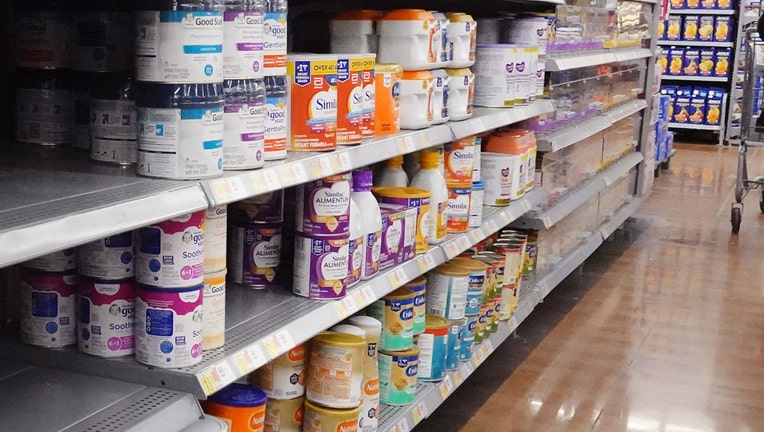FDA issues warning letters to 3 infant formula manufacturers

Baby formula is offered for sale at a big box store on January 13, 2022 in Chicago, Illinois. (Credit: Scott Olson/Getty Images)
The U.S. Food and Drug Administration has issued warning letters to three infant formula manufacturers as part of the agency’s commitment to help ensure that the industry is producing the formula under the safest conditions possible.
According to the FDA, the warning letters were for violations of the Federal Food, Drug, and Cosmetic Act (FD&C Act) and issued to ByHeart Inc., Mead Johnson Nutrition (Reckitt), and Perrigo Wisconsin, LLC.
In a press release published Wednesday, the agency said the letters reflect findings from FDA inspections of the companies’ facilities over the last several months.
At the time of each inspection, they initiated recalls to remove products potentially contaminated with Cronobacter sakazakii – a germ or pathogenic bacteria that can cause illness, primarily among infants – from the marketplace.

How car recalls get reported
The National Highway Traffic Safety Administration (NHTSA) officially start car recalls after receiving complaints from consumers.
The FDA said it does not advise parents and caregivers to discard or avoid purchasing any particular infant formula at this time, as the agency is not aware of any distributed product where contamination was confirmed and believes that the recalls were effective in removing the potentially contaminated batches of product from the market.
Additionally, these warning letters are not associated with any current recalls and therefore the FDA does not anticipate any impact on the availability of infant formula on the market.
The FDA said it is issuing these letters now as part of its normal regulatory process and to reinforce to these firms the importance of instituting and maintaining appropriate corrective actions when they detect pathogens to ensure compliance with the FDA’s laws and regulations.
Each company will have 15 working days to respond to the FDA to explain what corrective actions they are taking such as conducting root cause investigations and performing subsequent cleaning and sanitation activities.
RELATED: Federal commission finalizes ban of inclined infant sleepers, crib bumpers
The FDA will assess the adequacy of the companies’ corrective actions in the agency’s review of the responses and during the FDA’s next inspection of each facility. During these inspections the agency will verify proper implementation of appropriate corrective actions taken by each company.
"The FDA is committed to identifying and acting on issues early to prevent any firms from reaching the level of concern that prompted last year’s large-scale recall and contributed to the infant formula shortage," said Donald Prater, acting director of the FDA’s Center for Food Safety and Applied Nutrition. "Over the last year the FDA has continued to increase our oversight of powdered infant formula facilities. These letters are a reflection of this enhanced oversight and are intended to help the industry continuously improve the safety of their manufacturing practices, so that parents and caregivers can be confident that the formula they feed their children is safe and nutritious."
According to the FDA, the U.S. infant formula supply is healthy with in-stock rates at 85% or higher since the beginning of 2023. They said the current strength of this market can be largely attributed to the actions taken by the FDA and other U.S. government partners through 2022 and 2023.
Last year, the Abbott Laboratories infant formula plant in Michigan was shut down for months due to contamination and caused a nationwide baby formula shortage that forced parents to seek formula from food banks, friends and doctor’s offices. Production restarted in June of 2022.
This story was reported from Los Angeles.

